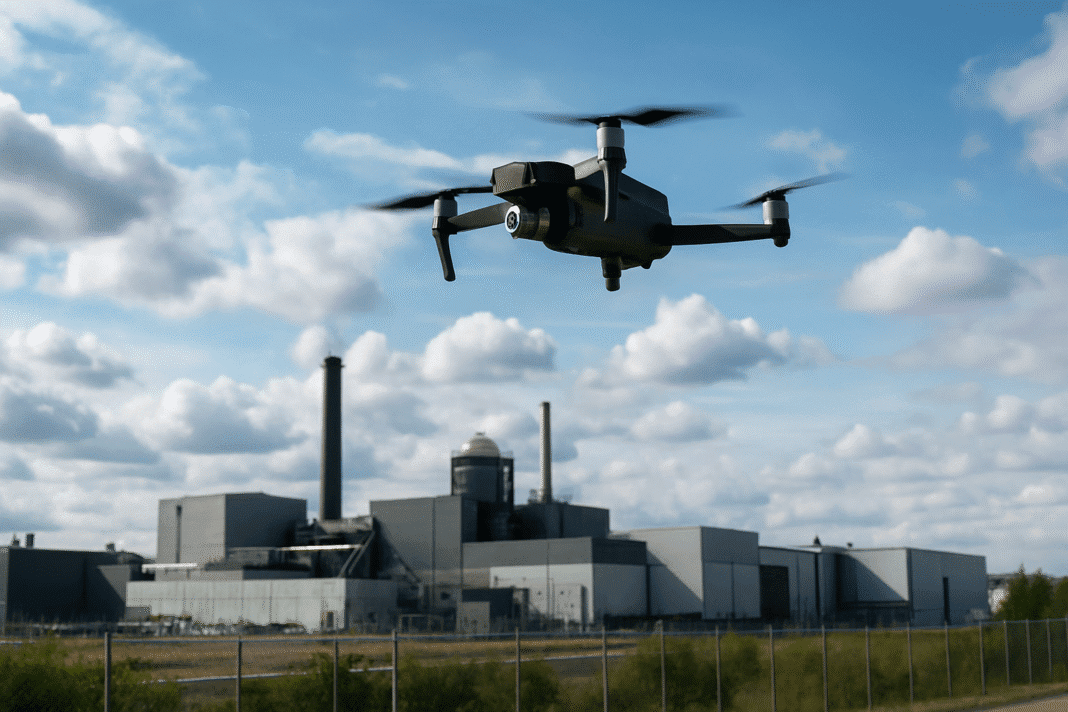Thales Belgium, a leading NATO weapons manufacturer, has raised concerns about a noticeable increase in unexplained drones activity above its top-secret factories. These facilities play a critical role in producing advanced military technology, including laser-guided rockets that conform to NATO standards.
Rising Drone Intrusions at Secret Military Sites
Officials at Thales Belgium reported a substantial increase in the number of drones near their sites over the past few months. The company is seeking guidance from authorities on how to respond to these mysterious aerial devices. This includes whether intercepting or shooting them down would be legally permissible.
This warning emerges amid a broader wave of drone disruptions across Europe. Airports in several NATO countries have temporarily shut down due to unidentified drones flying dangerously close to runways. Energy facilities, critical infrastructure, and military bases have also recorded unusual drone activity, raising alarm among security teams. The sudden increase in drone sightings has prompted military and civilian authorities to strengthen surveillance and defense protocols.
Dutch F-35 blasts Russian drone near NATO border — Europe on edge as skies turn volatile
Security teams at Thales Belgium are constantly monitoring the skies above their factories. The concern is that drones can be used for surveillance, intelligence gathering, or even sabotage. Although no incidents of damage have been reported yet, the unusual frequency of drone flyovers has heightened alert levels and prompted the company to review and tighten security measures.
Connection to NATO Weapon Production and Drones Threats
Thales Belgium is a key player in NATO’s defense supply chain. In 2024, the company increased production of a 70-mm laser-guided rocket. These rockets are supplied to Ukraine as part of NATO-standard weaponry. They are used to support defense operations against Russia’s ongoing invasion.
The factories targeted by these drones are highly secure. They handle sensitive military technology. Any unauthorized aerial activity over these facilities is treated as a serious security threat. Experts note that drones can be used for reconnaissance. They can also disrupt operations or compromise confidential information.
Trump threatens NATO with ultimatum: no unity, no sanctions on Russia
Thales Belgium has stressed that the recent surge in drone sightings is unusual. It indicates that these unmanned aerial vehicles are likely operated intentionally. They are not appearing accidentally. The persistent presence of drones over high-security areas has alarmed NATO defense contractors. It has also prompted discussions about stronger airspace security, surveillance systems, and response measures.
By monitoring drone activity closely, Thales Belgium aims to detect potential threats early. The company seeks to ensure the safety of personnel, sensitive equipment, and ongoing production. The increased vigilance also reflects the broader challenge facing NATO allies in maintaining secure environments for military manufacturing.
Widespread Drones Disruptions Across Europe
Across NATO member countries, drones have caused considerable disruption in recent months. Airports have been forced to close temporarily due to unidentified drones entering restricted airspace. Military bases, power plants, and other critical infrastructure have also reported swarms of drones flying overhead.
While many officials suspect that Russia could be behind some of these incidents, Moscow has consistently denied involvement. NATO member states are investigating each case carefully to determine the origin, purpose, and potential threat posed by the drones. As a result, authorities are gathering detailed information before taking further action.
NATO unleashes toughest stance since Ukraine war — member states can now act without waiting
The growing presence of drones reflects increasing concerns over the use of unmanned aerial vehicles for surveillance, reconnaissance, or intimidation. In other words, these drones pose both operational and security challenges. The technology is widely available, can operate quietly at low altitudes, and is challenging to detect. Consequently, it is difficult for security teams to maintain complete control over restricted airspace.
Thales Belgium’s alert highlights the heightened sensitivity surrounding military production in Europe. Above all, factories producing critical defense equipment are now on high alert. Security teams are continuously tracking drone activity and preparing protocols for possible interventions. Moreover, these measures emphasize the importance of safeguarding NATO assets from emerging technological threats in the airspace above critical facilities.
